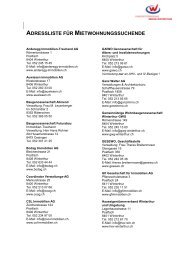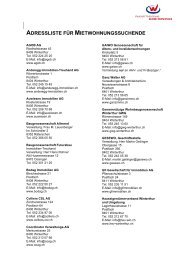Handbook for Investors. Business location in Switzerland.
Handbook for Investors. Business location in Switzerland.
Handbook for Investors. Business location in Switzerland.
You also want an ePaper? Increase the reach of your titles
YUMPU automatically turns print PDFs into web optimized ePapers that Google loves.
Non-resident companies are subject to tax only on Swiss source<br />
<strong>in</strong>come, i.e., <strong>in</strong>come and capital ga<strong>in</strong>s derived from Swiss bus<strong>in</strong>ess,<br />
permanent establishments or immovable property, whereas<br />
<strong>in</strong>come from immovable property <strong>in</strong>cludes <strong>in</strong>come from trad<strong>in</strong>g <strong>in</strong><br />
immovable property.<br />
As a matter of pr<strong>in</strong>ciple, the statutory accounts of a Swiss<br />
company and – <strong>in</strong> the case of a <strong>for</strong>eign company – the branch<br />
accounts <strong>for</strong>m the basis <strong>for</strong> determ<strong>in</strong><strong>in</strong>g taxable <strong>in</strong>come. Apart<br />
from the participation exemption <strong>for</strong> dividend and capital ga<strong>in</strong>s<br />
<strong>in</strong>come, various adjustments required by tax law and the use of<br />
exist<strong>in</strong>g loss carry<strong>for</strong>wards (the loss carry<strong>for</strong>ward period is seven<br />
years), there are very few differences between statutory profit<br />
and taxable profit. The most common deductions allowed are<br />
depreciation, tax expense, <strong>in</strong>terest expense and management and<br />
service fees/royalties. The last two are deductible to the extent<br />
that they are <strong>in</strong> accordance with the arm’s-length pr<strong>in</strong>ciple.<br />
Th<strong>in</strong> capitalization<br />
The Swiss Federal Tax Adm<strong>in</strong>istration has issued safe harbor<br />
rules <strong>for</strong> th<strong>in</strong> capitalization purposes that apply to related party<br />
debt. Third-party f<strong>in</strong>anc<strong>in</strong>g is not affected by those rules. Specifically<br />
speak<strong>in</strong>g, a unique asset-based test is used to determ<strong>in</strong>e<br />
whether a company is adequately f<strong>in</strong>anced. The th<strong>in</strong> capitalization<br />
rules require that each asset class (<strong>in</strong> general, fair market value,<br />
but often the lower book values suffice) has to be underp<strong>in</strong>ned by<br />
a certa<strong>in</strong> equity portion.<br />
Related-party debt exceed<strong>in</strong>g the allowable debt as calculated<br />
accord<strong>in</strong>g to the percentages provided by the Federal Tax<br />
Adm<strong>in</strong>istration is reclassified as equity and added back to the<br />
taxable capital <strong>for</strong> purposes of the cantonal/municipal annual<br />
capital tax, unless it can be proven that <strong>in</strong> this particular case the<br />
debt terms applied are more appropriate.<br />
Moreover, the allowable <strong>in</strong>terest deductibility on debt can be<br />
determ<strong>in</strong>ed by multiply<strong>in</strong>g the allowable debt by the safe harbor<br />
<strong>in</strong>terest rates. If <strong>in</strong>terest payments to related parties exceed the<br />
amount which can be paid based on the allowable debt, they are<br />
added back to taxable profit. Further, such <strong>in</strong>terest is considered<br />
to be a hidden dividend distribution (subject to withhold<strong>in</strong>g tax of<br />
35 %).<br />
Group consolidation<br />
Separate entity taxation applies <strong>in</strong> <strong>Switzerland</strong> <strong>for</strong> <strong>in</strong>come tax<br />
purposes. Group consolidation is not anticipated to be <strong>in</strong>troduced<br />
<strong>in</strong> the near future.<br />
Group reorganizations<br />
Group reorganizations are governed by the Swiss merger law<br />
which regulates reorganizations and mergers from both a tax and<br />
legal perspective and are, if certa<strong>in</strong> conditions are met, possible<br />
on a tax neutral basis to the extent that the assets rema<strong>in</strong> <strong>in</strong><br />
<strong>Switzerland</strong> and the tax book values of the assets and liabilities<br />
rema<strong>in</strong> unchanged.<br />
10.1.2 Corporate <strong>in</strong>come tax – cantonal and municipal level<br />
Given the tax harmonization on the cantonal and municipal levels,<br />
most tax rules are identical or very similar to the rules on the<br />
federal level set <strong>for</strong>th above (e.g. participation exemption, loss<br />
carry<strong>for</strong>ward rules and <strong>in</strong> most cases th<strong>in</strong> capitalization rules).<br />
Special tax regimes<br />
In contrast to the Swiss federal tax law, all cantonal tax laws offer<br />
special tax regimes, which may be obta<strong>in</strong>ed provided that the<br />
conditions accord<strong>in</strong>g to the tax harmonization law are met. The<br />
follow<strong>in</strong>g tax regimes are typically prevalent <strong>in</strong> <strong>Switzerland</strong> and<br />
relevant <strong>in</strong>ternationally:<br />
A) Hold<strong>in</strong>g company<br />
The hold<strong>in</strong>g company tax status is available to Swiss companies<br />
(or permanent establishments of a <strong>for</strong>eign company), whose<br />
primary purpose is accord<strong>in</strong>g to the by-laws to hold and manage<br />
long-term equity <strong>in</strong>vestments <strong>in</strong> affiliated companies. Furthermore,<br />
the company must pass an alternative asset or <strong>in</strong>come test,<br />
whereby either two-thirds of the company’s assets must consist<br />
of substantial sharehold<strong>in</strong>gs or participations or two-thirds of<br />
total <strong>in</strong>come of the company must consist of participation <strong>in</strong>come<br />
(dividend <strong>in</strong>come or capital ga<strong>in</strong>s) from such sharehold<strong>in</strong>gs and<br />
participations.<br />
<strong>Handbook</strong> <strong>for</strong> <strong>Investors</strong> 2010<br />
91









